中国的独生子女政策 One-child policy in China
- 格式:pptx
- 大小:5.29 MB
- 文档页数:29
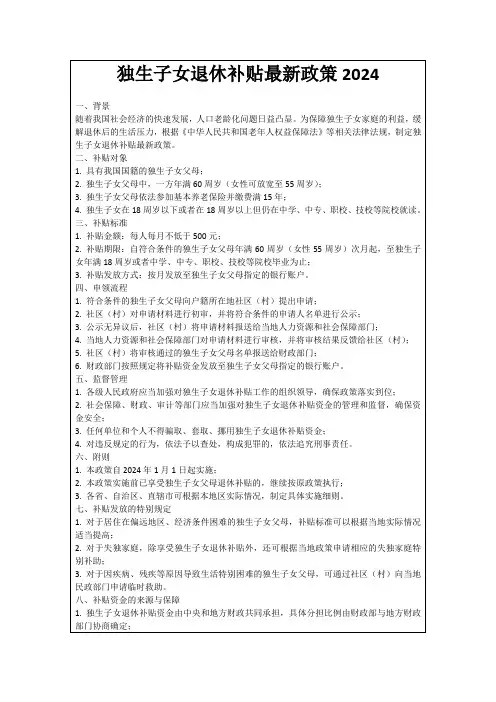
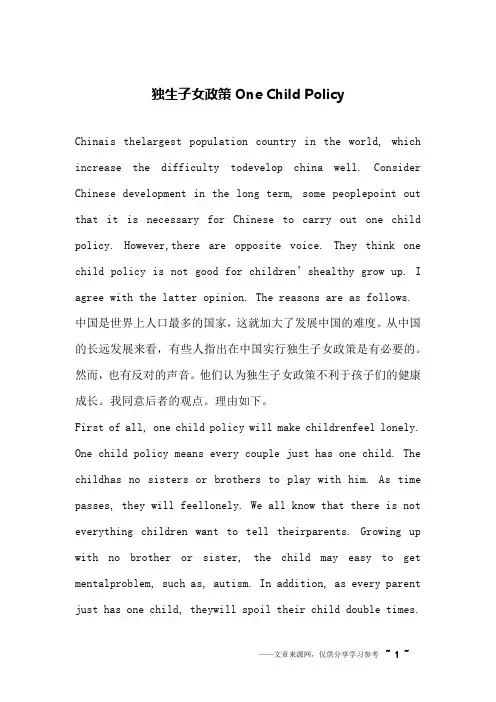
独生子女政策One Child PolicyChinais thelargest population country in the world, which increase the difficulty todevelop china well. Consider Chinese development in the long term, some peoplepoint out that it is necessary for Chinese to carry out one child policy. However,there are opposite voice. They think one child policy is not good for children’shealthy grow up. I agree with the latter opinion. The reasons are as follows. 中国是世界上人口最多的国家,这就加大了发展中国的难度。
从中国的长远发展来看,有些人指出在中国实行独生子女政策是有必要的。
然而,也有反对的声音。
他们认为独生子女政策不利于孩子们的健康成长。
我同意后者的观点。
理由如下。
First of all, one child policy will make childrenfeel lonely. One child policy means every couple just has one child. The childhas no sisters or brothers to play with him. As time passes, they will feellonely. We all know that there is not everything children want to tell theirparents. Growing up with no brother or sister, the child may easy to get mentalproblem, such as, autism. In addition, as every parent just has one child, theywill spoil their child double times.As a result, the child will the so called littleemperor or little princess. When the child grows up, it is possible thathe couldn’t adjust the world, the society, because no one will treat them aslittle emperor or little princess except their parents.首先,独生子女政策会让孩子感到孤独。
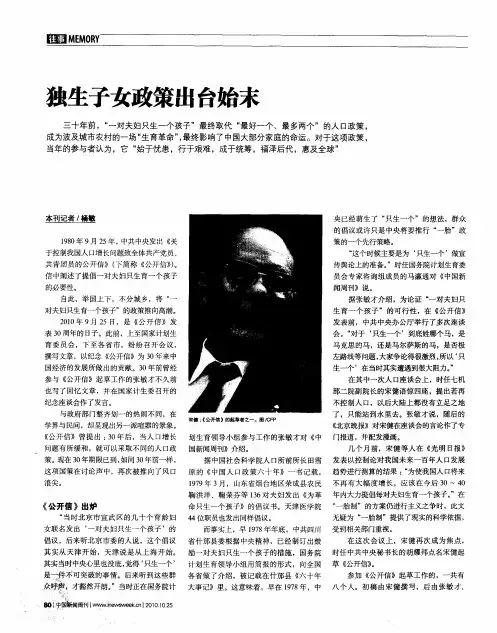
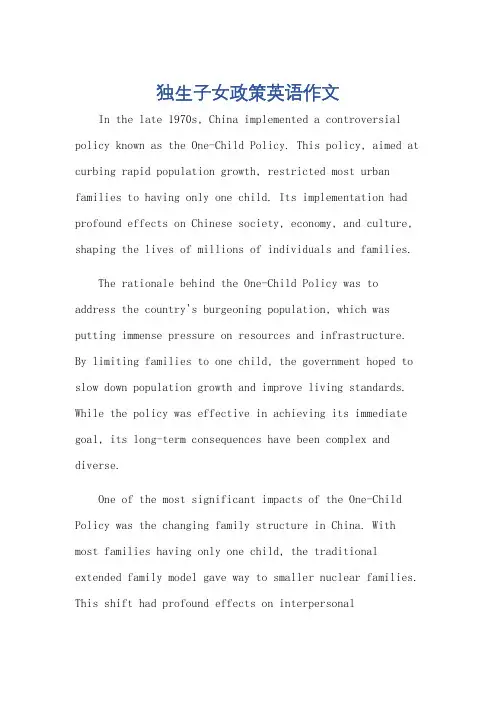
独生子女政策英语作文In the late 1970s, China implemented a controversial policy known as the One-Child Policy. This policy, aimed at curbing rapid population growth, restricted most urban families to having only one child. Its implementation had profound effects on Chinese society, economy, and culture, shaping the lives of millions of individuals and families. The rationale behind the One-Child Policy was to address the country's burgeoning population, which was putting immense pressure on resources and infrastructure. By limiting families to one child, the government hoped to slow down population growth and improve living standards. While the policy was effective in achieving its immediate goal, its long-term consequences have been complex and diverse.One of the most significant impacts of the One-Child Policy was the changing family structure in China. With most families having only one child, the traditional extended family model gave way to smaller nuclear families. This shift had profound effects on interpersonalrelationships, inheritance practices, and even the way people perceived their identity and role in society.The One-Child Policy also had economic implications. As families had fewer children to support, they could invest more resources in educating and providing for their only child. This led to a significant increase in educational opportunities for girls, who had traditionally been denied access to higher education due to cultural biases. The policy also contributed to China's economic boom by ensuring a larger workforce and lower dependency ratios.However, the One-Child Policy also gave rise to several social issues. One of the most significant was the phenomenon of the "left-behind children," who were left in the care of grandparents or relatives while their parents migrated to cities for work. These children often suffered from emotional and psychological problems due to lack of parental care and attention.Another issue was the increasing gender imbalance in China, which was partially attributed to the preference for male children. This preference led to a high number of female fetuses being aborted or neglected, resulting in asignificant gender gap in the population. This gender imbalance has led to social problems such as increased crime rates and marriage difficulties for men.In recognition of these issues, China began to gradually relax the One-Child Policy in 2011, allowing families to have two children if both parents were only children. This policy change aimed to address the gender imbalance and aging population issues while maintaining population control. However, the impact of this new policy remains to be seen, as it will take time for its effects to manifest in the population structure and social fabric of China.In conclusion, the One-Child Policy was a significant milestone in Chinese history, having profound effects on the country's population, economy, and society. While it achieved its immediate goals of population control and economic growth, its long-term consequences have been complex and diverse, giving rise to new challenges and opportunities for China to address in the future.**中国独生子女政策的影响**20世纪70年代末,中国实施了一项引起争议的政策,即独生子女政策。
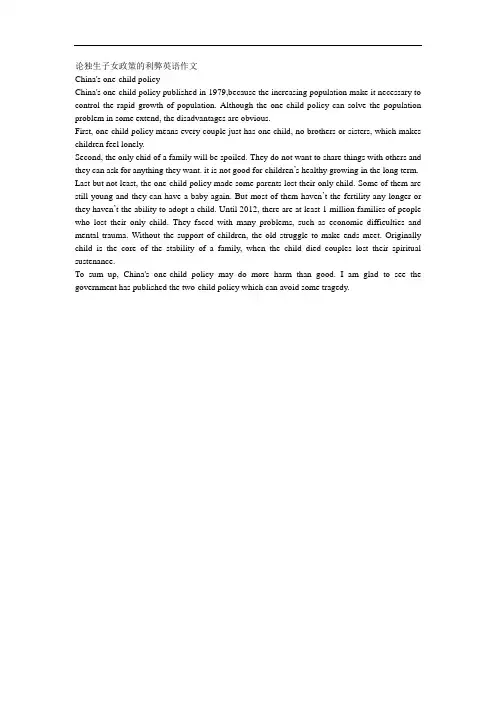
论独生子女政策的利弊英语作文China's one-child policyChina's one-child policy published in 1979,because the increasing population make it necessary to control the rapid growth of population. Although the one child policy can solve the population problem in some extend, the disadvantages are obvious.First, one-child policy means every couple just has one child, no brothers or sisters, which makes children feel lonely.Second, the only chid of a family will be spoiled. They do not want to share things with others and they can ask for anything they want. it is not good for children’s healthy growing in the long term. Last but not least, the one-child policy made some parents lost their only child. Some of them are still young and they can have a baby again. But most of them haven’t the fertility any longer or they haven’t the ability to adopt a child. Until 2012, there are at least 1 million families of people who lost their only child. They faced with many problems, such as economic difficulties and mental trauma. Without the support of children, the old struggle to make ends meet. Originally child is the core of the stability of a family, when the child died couples lost their spiritual sustenance.To sum up, China's one-child policy may do more harm than good. I am glad to see the government has published the two-child policy which can avoid some tragedy.。
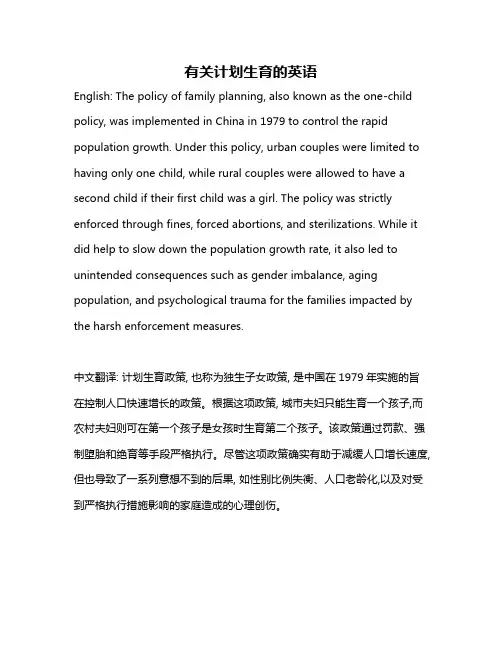
有关计划生育的英语English: The policy of family planning, also known as the one-child policy, was implemented in China in 1979 to control the rapid population growth. Under this policy, urban couples were limited to having only one child, while rural couples were allowed to have a second child if their first child was a girl. The policy was strictly enforced through fines, forced abortions, and sterilizations. While it did help to slow down the population growth rate, it also led to unintended consequences such as gender imbalance, aging population, and psychological trauma for the families impacted by the harsh enforcement measures.中文翻译: 计划生育政策, 也称为独生子女政策, 是中国在1979年实施的旨在控制人口快速增长的政策。
根据这项政策, 城市夫妇只能生育一个孩子,而农村夫妇则可在第一个孩子是女孩时生育第二个孩子。
该政策通过罚款、强制堕胎和绝育等手段严格执行。
尽管这项政策确实有助于减缓人口增长速度,但也导致了一系列意想不到的后果, 如性别比例失衡、人口老龄化,以及对受到严格执行措施影响的家庭造成的心理创伤。
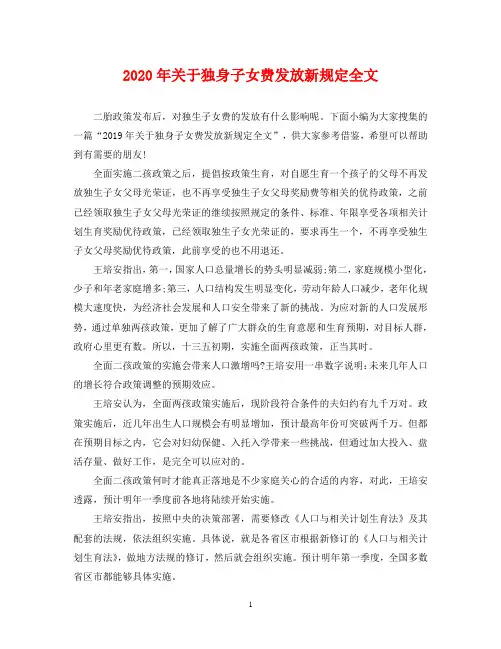
2020年关于独身子女费发放新规定全文二胎政策发布后,对独生子女费的发放有什么影响呢。
下面小编为大家搜集的一篇“2019年关于独身子女费发放新规定全文”,供大家参考借鉴,希望可以帮助到有需要的朋友!全面实施二孩政策之后,提倡按政策生育,对自愿生育一个孩子的父母不再发放独生子女父母光荣证,也不再享受独生子女父母奖励费等相关的优待政策,之前已经领取独生子女父母光荣证的继续按照规定的条件、标准、年限享受各项相关计划生育奖励优待政策,已经领取独生子女光荣证的,要求再生一个,不再享受独生子女父母奖励优待政策,此前享受的也不用退还。
王培安指出,第一,国家人口总量增长的势头明显减弱;第二,家庭规模小型化,少子和年老家庭增多;第三,人口结构发生明显变化,劳动年龄人口减少,老年化规模大速度快,为经济社会发展和人口安全带来了新的挑战。
为应对新的人口发展形势,通过单独两孩政策,更加了解了广大群众的生育意愿和生育预期,对目标人群,政府心里更有数。
所以,十三五初期,实施全面两孩政策,正当其时。
全面二孩政策的实施会带来人口激增吗?王培安用一串数字说明:未来几年人口的增长符合政策调整的预期效应。
王培安认为,全面两孩政策实施后,现阶段符合条件的夫妇约有九千万对。
政策实施后,近几年出生人口规模会有明显增加,预计最高年份可突破两千万。
但都在预期目标之内,它会对妇幼保健、入托入学带来一些挑战,但通过加大投入、盘活存量、做好工作,是完全可以应对的。
全面二孩政策何时才能真正落地是不少家庭关心的合适的内容,对此,王培安透露,预计明年一季度前各地将陆续开始实施。
王培安指出,按照中央的决策部署,需要修改《人口与相关计划生育法》及其配套的法规,依法组织实施。
具体说,就是各省区市根据新修订的《人口与相关计划生育法》,做地方法规的修订,然后就会组织实施。
预计明年第一季度,全国多数省区市都能够具体实施。
王培安说,我国在制定资源环境中长期战略规划目标时,已经为生育政策调整完善预留了空间,据有关部门测算,我国的能源、粮食等供给都在可承受范围之内,不会影响国家既定资源环境质量目标的实现。
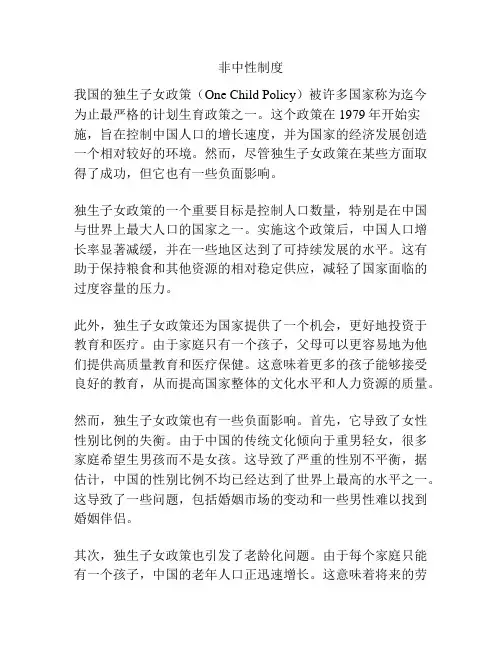
非中性制度我国的独生子女政策(One Child Policy)被许多国家称为迄今为止最严格的计划生育政策之一。
这个政策在1979年开始实施,旨在控制中国人口的增长速度,并为国家的经济发展创造一个相对较好的环境。
然而,尽管独生子女政策在某些方面取得了成功,但它也有一些负面影响。
独生子女政策的一个重要目标是控制人口数量,特别是在中国与世界上最大人口的国家之一。
实施这个政策后,中国人口增长率显著减缓,并在一些地区达到了可持续发展的水平。
这有助于保持粮食和其他资源的相对稳定供应,减轻了国家面临的过度容量的压力。
此外,独生子女政策还为国家提供了一个机会,更好地投资于教育和医疗。
由于家庭只有一个孩子,父母可以更容易地为他们提供高质量教育和医疗保健。
这意味着更多的孩子能够接受良好的教育,从而提高国家整体的文化水平和人力资源的质量。
然而,独生子女政策也有一些负面影响。
首先,它导致了女性性别比例的失衡。
由于中国的传统文化倾向于重男轻女,很多家庭希望生男孩而不是女孩。
这导致了严重的性别不平衡,据估计,中国的性别比例不均已经达到了世界上最高的水平之一。
这导致了一些问题,包括婚姻市场的变动和一些男性难以找到婚姻伴侣。
其次,独生子女政策也引发了老龄化问题。
由于每个家庭只能有一个孩子,中国的老年人口正迅速增长。
这意味着将来的劳动力将面临很大的压力,同时也增加了养老金和社会保障支出的负担。
这可能对国家经济造成一定的负面影响。
最后,独生子女政策还导致了一些心理上的问题。
独生子女通常受到过多的家庭关注和期望,这可能给他们带来很大的压力。
此外,他们也经历了缺乏兄弟姐妹的互动和竞争,这可能影响他们的社交能力和个人发展。
总的来说,尽管独生子女政策在控制人口数量方面取得了一定的成功,并为国家提供了一些机会,但它也带来了一些负面影响。
解决这些问题需要政府采取更多措施,以平衡计划生育政策的利弊,并更好地满足人们的需求和期望。
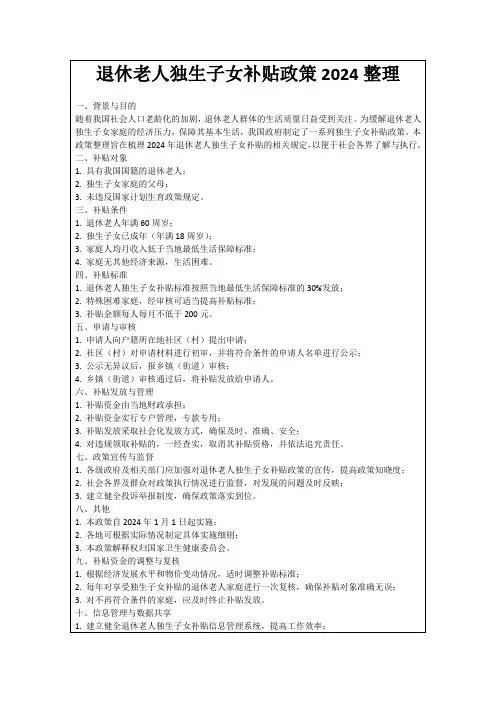
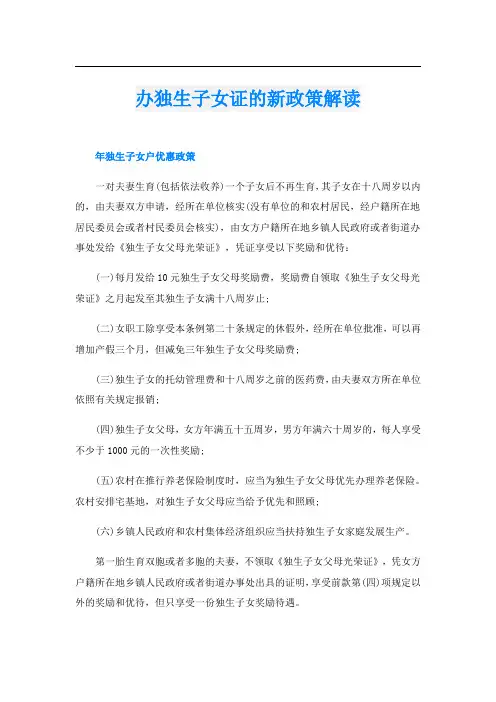
办独生子女证的新政策解读年独生子女户优惠政策一对夫妻生育(包括依法收养)一个子女后不再生育,其子女在十八周岁以内的,由夫妻双方申请,经所在单位核实(没有单位的和农村居民,经户籍所在地居民委员会或者村民委员会核实),由女方户籍所在地乡镇人民政府或者街道办事处发给《独生子女父母光荣证》,凭证享受以下奖励和优待:(一)每月发给10元独生子女父母奖励费,奖励费自领取《独生子女父母光荣证》之月起发至其独生子女满十八周岁止;(二)女职工除享受本条例第二十条规定的休假外,经所在单位批准,可以再增加产假三个月,但减免三年独生子女父母奖励费;(三)独生子女的托幼管理费和十八周岁之前的医药费,由夫妻双方所在单位依照有关规定报销;(四)独生子女父母,女方年满五十五周岁,男方年满六十周岁的,每人享受不少于1000元的一次性奖励;(五)农村在推行养老保险制度时,应当为独生子女父母优先办理养老保险。
农村安排宅基地,对独生子女父母应当给予优先和照顾;(六)乡镇人民政府和农村集体经济组织应当扶持独生子女家庭发展生产。
第一胎生育双胞或者多胞的夫妻,不领取《独生子女父母光荣证》,凭女方户籍所在地乡镇人民政府或者街道办事处出具的证明,享受前款第(四)项规定以外的奖励和优待,但只享受一份独生子女奖励待遇。
第二条已婚育龄夫妻按照规定可以生育第二个子女,但书面表示不再生育的,由各自所在单位或者乡镇人民政府、街道办事处给予表彰,并给予每人不少于500元的一次性奖励。
第三条独生子女发生意外伤残致使基本丧失劳动能力或者死亡,其父母不再生育或者收养子女的,女方年满五十五周岁,男方年满六十周岁的,所在区、县人民政府应当给予每人不少于5000元的一次性经济帮助。
第四条本市各级人民政府和各有关部门应当制定和完善有利于独生子女父母的老年保障制度和措施。
本市有条件的乡镇,可以根据政府引导、农民自愿的原则,实行多种形式的养老保障办法。
第五条本市各级人民政府对农村实行计划生育的家庭发展经济,给予资金、技术、培训等方面的支持和优惠;对实行计划生育的贫困家庭在扶贫贷款、扶贫项目、以工代赈和社会救济等方面给予优先照顾。
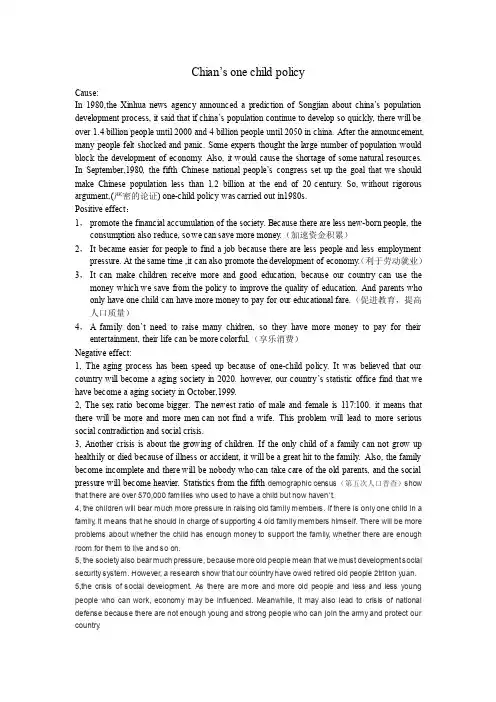
Chian’s one child policyCause:In 1980,the Xinhua news agency announced a prediction of Songjian about china’s population development process, it said that if china’s population continue to develop so quickly, there will be over 1.4 billion people until 2000 and 4 billion people until 2050 in china. After the announcement, many people felt shocked and panic. Some experts thought the large number of population would block the development of economy. Also, it would cause the shortage of some natural resources. In September,1980, the fifth Chinese national people’s congress set up the goal that we should make Chinese population less than 1.2 billion at the end of 20 century. So, without rigorous argument,(严密的论证) one-child policy was carried out in1980s.Positive effect:1,promote the financial accumulation of the society. Because there are less new-born people, the consumption also reduce, so we can save more money.(加速资金积累)2,It became easier for people to find a job because there are less people and less employment pressure. At the same time ,it can also promote the development of economy.(利于劳动就业)3,It can make children receive more and good education, because our country can use the money which we save from the policy to improve the quality of education. And parents who only have one child can have more money to pay for our educational fare.(促进教育,提高人口质量)4,A family don’t need to raise many chidren, so they have more money to pay for their entertainment, their life can be more colorful.(享乐消费)Negative effect:1, The aging process has been speed up because of one-child policy. It was believed that our country will become a aging society in 2020. however, our country’s statistic office find that we have become a aging society in October,1999.2, The sex ratio become bigger. The newest ratio of male and female is 117:100. it means that there will be more and more men can not find a wife. This problem will lead to more serious social contradiction and social crisis.3, Another crisis is about the growing of children. If the only child of a family can not grow up healthily or died because of illness or accident, it will be a great hit to the family. Also, the family become incomplete and there will be nobody who can take care of the old parents, and the social pressure will become heavier. Statistics from the fifth demographic census(第五次人口普查)show that there are over 570,000 families who used to have a child but now haven’t.4, the children will bear much more pressure in raising old family members. If there is only one child in a family, it means that he should in charge of supporting 4 old family members himself. There will be more problems about whether the child has enough money to support the family, whether there are enough room for them to live and so on.5, the society also bear much pressure, because more old people mean that we must development social security system. However, a research show that our country have owed retired old people 2trilion yuan. 5,the crisis of social development. As there are more and more old people and less and less young people who can work, economy may be influenced. Meanwhile, it may also lead to crisis of national defense because there are not enough young and strong people who can join the army and protect our country.In my opinion, this policy do some benefit to the society at the beginning. However, we can see the disadvantage of it overweight the advantage from my analysis just now. so I think that we should adjust the policy according to the situation in different regions. Such as in those districts which have serious aging effect, we should give up the policy. But in those districts which still have high rate birth, we should keep the policy. Meanwhile, the government should take more suggestion from all fields of the society into consideration. It is because that one-child policy didn’t consider about people’s suggestions before it was carried out, now there are many problems we can not solve. So, I believe if the government take more suggestion from people, problems can be reduced.。
英语作文最近,一项新政策一三孩政策三孩生)引起了热烈的讨论官方媒体没有透露新政策何时实施。
就在三周前,北京公布了2020年人口普查数据,显示中国人口增长速度为数十年来最低。
State media did not say when the new policy would be implemented. It comes just three weeks after Beijing published its 2020 census, which showed China's population was growing at its slowest rate in decades.根据中国国家统计局的数据,在过去的十年里,中国的人口只增长了5.38%,这是自上世纪60年代以来最慢的增长率。
According to China's National Bureau of Statistics, the population rose by just 5.38% over the past decade -- the slowest growth rate since at least the 1960s.中国的独生子女政策于1979年出台,35多年来,随着中国努力解决人口过剩和脱贫问题,独生子女数量一直受到限制。
China's one-child policy was introduced in 1979 and for more than 35 years limited couples to a single offspring, as the country tried to address overpopulation and alleviate poverty.近年来,中国经济蓬勃发展,人口需求也发生了变化。
如今,政府依靠大量年轻劳动力来支持高水平的经济增长。
为了避免人口危机,中国政府在2015年宣布放宽生育限制,允许每个家庭最多生育两个孩子。
国家独生子女补贴2023最新政策规定独生子女的政策补贴1、独生子女父母奖金补贴独生子女父母在《独生子女父母光荣证》颁发后,截至子女14周岁(各省市法规有所不同),凭证件就可以领取独生子女父母奖金补贴,每个地区补贴的金额不同,最高为2000元,每月补贴10-80元不等。
2、独生子女生育奖励扶助补贴这是针对农村独生子女父母,在年满60周岁以后,可享受生育家庭奖励扶助补贴,每人每年960元,但是需要保留好自己的《独生子女父母光荣证》,凭证领取。
3、独生子女家庭伤残扶助补贴如果因为独生子女出现意外伤残,每月可以领取270元的补贴。
4、独生子女人员死亡补贴除了伤残意外,独生子女如果因为意外身故,他(她)的直系亲属都能每人每月领到340元的补贴抚恤金。
5、独生子女教育补贴对于农村独生子女家庭,我国也会给予一定的教育补贴,主要体现在两个方面:(1)可享受高考加分优惠法规;(2)发放现金补贴,补贴金额一般在1000-3000元。
对于贫困家庭还可以免除学杂费。
6、独生子女个税减免个税起征点目前是5000元,如果独生子女父母已经超过60岁,那么每月能够享受2000元的个税减。
7、独生子女护理假我国对独生子女是提供了护理假的,不同地区假期天数有所不同。
8、一次性奖励补贴父母一次性奖励一般是在退休时领取,全国并未设定统一标准,各个地区是不一样的,北京地区独生子女父母一次性奖励发放不低于1000元;上海一次性奖励补贴标准是5000元;河北是3000元;武汉是3500元。
2023年企业政府补贴政策有哪些?2023年企业政府补贴政策有:阶段性降低失业保险费率,按1%执行,其中单位费率0.7%,个人费率0.3%。
阶段性缓缴社保费,允许企业在2023年底前采取分期或逐月等方式补缴缓缴的社会保险费,补缴期间免收滞纳金。
稳岗返还,中小微企业按企业及其职工上年度实际缴纳失业保险费的60%返还,大型企业按30%返还。
大学生就业补助政策一、补贴标准全国大中专院校2021推荐双方都可获得就业、实习补贴1200元/人/年(3人),以100元/人/月标准按月发放。
独生子女父母补贴领取的流程及时间独生子女父母补贴是中国政府为了鼓励计划生育政策并支持独生子女家庭所设立的政策。
The subsidy for parents of only child is a policy set upby Chinese government to encourage the one-child policy and support families with only one child.申请补贴需要向当地计划生育政府部门提交相关材料,包括身份证、户口本、结婚证、孩子的出生证等。
To apply for the subsidy, you need to submit relevant documents to the local family planning government department, including ID cards, household registration book, marriage certificate, child's birth certificate, etc.经审核通过后,可以领取每月的补贴,一般是通过银行卡发放。
After being approved, you can receive the monthly subsidy, which is usually distributed through a bank card.另外,还可以选择一次性领取全年的补贴。
In addition, you can also choose to receive the subsidy for the whole year in one lump sum.补贴的标准和领取条件因地区而异,具体情况需咨询当地计划生育政府部门。
The standards and conditions for receiving the subsidy vary from region to region, and you should consult the local family planning government department for specific details.一般来说,申请补贴的时间是每年的年初,具体日期会根据当地政策而有所不同。
写一篇改革独生子女政策的英语作文全文共3篇示例,供读者参考篇1Reforming the One-Child PolicyIntroductionChina's one-child policy, implemented in 1979 to curb population growth, has had far-reaching consequences on society and demographics. In recent years, the government has relaxed the policy to allow for more flexibility in family planning. However, many argue that further reforms are necessary to address issues such as an aging population, gender imbalance, and economic challenges. In this essay, we will explore the need for reforming the one-child policy and propose potential solutions.Effects of the One-Child PolicyThe one-child policy has had several unintended consequences that have shaped the demographics and social fabric of China. One of the most significant impacts has been the aging population, with a shrinking workforce and an increasing burden on social welfare systems. The policy has also led to agender imbalance, with a preference for male children resulting in a surplus of men in certain age groups. Additionally, the policy has had negative effects on mental health, as many families have faced pressure and stigma for violating the one-child rule.Proposed ReformsGiven the challenges posed by the one-child policy, it is clear that reforms are needed to address these issues and promote a more sustainable and equitable society. One possible reform is to relax restrictions on the number of children families can have, allowing for more flexibility in family planning. This could help address the aging population and gender imbalance by encouraging more births and balancing the sex ratio. Another option is to provide incentives for families to have more children, such as tax breaks, childcare support, and improved parental leave policies.Furthermore, reforms could focus on providing support for families with multiple children, including access to healthcare, education, and social services. This could help reduce the stigma associated with having more than one child and promote a more inclusive and supportive environment for families. Additionally, reforms could prioritize gender equality and empower women tomake choices about their reproductive health, ensuring that all children are valued and supported regardless of their gender.ConclusionIn conclusion, the one-child policy has had significant impacts on Chinese society and demographics, and reforms are necessary to address these challenges and promote a more sustainable and equitable future. By relaxing restrictions on family planning, providing incentives for more children, and supporting families with multiple children, China can create a more inclusive and supportive environment for all families. It is time to reform the one-child policy and build a brighter future for the next generation.篇2Reforming the One-Child Policy in ChinaIntroductionFor over three decades, China's one-child policy has been one of the most controversial and heavily debated topics in the country. Introduced in 1979 in an effort to curb the rapid population growth, the policy has led to various social, economic, and ethical issues. As the country continues to face demographic challenges, it is crucial to discuss and consider reforming theone-child policy to better address the changing needs of the society.Challenges and IssuesThe one-child policy has had a profound impact on China's population structure, leading to an aging population, a shrinking labor force, and a gender imbalance. With a rapidly aging population and a declining birth rate, China is facing the challenge of providing care and support for the elderly population while maintaining economic growth. Moreover, the policy has resulted in a gender imbalance, with many families preferring male children over female children. This has led to a skewed sex ratio, creating social and psychological issues for the younger generation.Reforming the PolicyIn light of these challenges and issues, it is imperative to reform the one-child policy to address the evolving needs of the society. One possible approach is to gradually phase out the policy and implement a two-child policy, allowing families to have more than one child. This would help address the issues of an aging population and shrinking labor force, while also promoting gender equality and empowering women to make decisions about their reproductive rights.Furthermore, the government could provide incentives and support for families who choose to have more than one child, such as tax breaks, maternity leave benefits, and childcare services. These measures would help alleviate the financial burden of raising multiple children and encourage families to have more children.ConclusionIn conclusion, reforming the one-child policy is essential for addressing the demographic challenges faced by China. By implementing a more flexible and inclusive policy that encourages families to have more than one child, the government can promote sustainable population growth, maintain a healthy balance between the working-age population and the elderly population, and improve gender equality in society. It is time for China to rethink its population policy and embrace a new approach that considers the needs and aspirations of its people.篇3Reforming the One-Child PolicyThe one-child policy, implemented in China in 1979, was aimed at controlling population growth. However, after morethan four decades, it is evident that this policy has led to numerous social, economic, and demographic challenges. Therefore, it is imperative to reform the one-child policy to address these issues and promote a more balanced and sustainable population growth.One of the major consequences of the one-child policy is the skewed gender ratio in China. Due to the traditional preference for sons, many families resorted to sex-selective abortions and female infanticide to ensure their one allowed child was a boy. As a result, there are now significantly more men than women in China, leading to social instability and an increase in human trafficking and forced marriages.Moreover, the one-child policy has resulted in a rapidly aging population and a shrinking workforce. With fewer young people to support the elderly, there is a growing burden on the healthcare and pension systems. Additionally, the lack of a younger workforce could hinder economic growth and innovation in the long run.To address these challenges, the Chinese government should consider reforming the one-child policy. One possible solution is to relax the restrictions on the number of children allowed per family. This could help balance the gender ratio byreducing the pressure to have a son, as well as increase the number of young people in the workforce to support the aging population.Furthermore, the government could incentivize couples to have more children by offering financial support, such as tax breaks, subsidies, and childcare assistance. This would help alleviate the financial burden of raising multiple children and encourage families to have more offspring.In addition to increasing the birth rate, the government should also focus on improving the quality of life for children in China. This includes investing in education, healthcare, and social welfare programs to ensure that every child has access to a good quality of life and equal opportunities.Overall, reforming the one-child policy is crucial to ensure a sustainable and balanced population growth in China. By addressing the gender imbalance, aging population, and workforce shortage, the government can pave the way for a brighter future for the next generation. It is time for China to move towards a more inclusive and supportive family planning policy that prioritizes the well-being of its citizens.。
【英语作文】独生子女政策One Child PolicyChinaisthelargestpopulationcountryintheworld,whichincreasethedifficultytodevelopchinawellHowever,thereareoppositevoiceIagreewiththelatteropinion中国是世界上人口最多的国家,这就加大了发展中国的难度。
从中国的长远发展来看,有些人指出在中国实行独生子女政策是有必要的。
然而,也有反对的声音。
他们认为独生子女政策不利于孩子们的健康成长。
我同意后者的观点。
理由如下。
Firstofall,onechildpolicywillmakechildrenfeellonelyThechildhasnosistersorbrotherstoplaywithhimWeallknowthatthereisnoteverythingchildrenwa nttotelltheirparentsInaddition,aseveryparentjusthasonechild,theywillspoiltheirchilddoubletimesWhenthechildgrowsup,itispossiblethat hecouldn’tadjusttheworld,thesociety,becausenoonewilltreatthemaslittleemperororlittleprincessexcepttheirparentsBecauseitisnotgoodfortheyoungge neration’shealthygrowingupforthereasonsmentionabove.总之,独生子女政策在某种程度上也许可以解决一些人口问题,但它并不利于中国的长期发展。
因为基于以上提到的原因,它并不利于年轻一代的健康成长的。